
Richard Spurr 1am - 4am
25 June 2022, 08:01 | Updated: 25 June 2022, 15:12
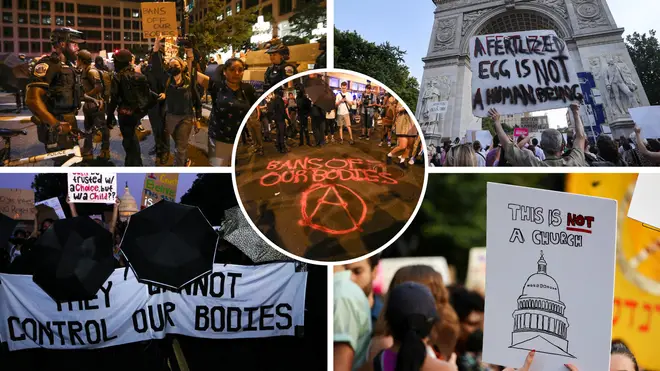
Protests have erupted across the US and some abortion clinics immediately shut their doors after the Supreme Court overthrew the landmark Roe v Wade.
The Arizona State Senate had to be evacuated because of the protests, the Mirror reports.
Police used tear gas on crowds that had surrounded the building, and a window was smashed in the commotion.
"As of today, all abortion care in the state of Arizona has ceased pending legal ramifications," Amy Fitch-Heacock, founder of a reproductive rights group, told AzCentral.
"I fight because I know what happens to women who are denied abortion care... I fight because I know what happens to single mothers who raise children alone abandoned by the men who promised to show up."
Read more: Trump declares US anti-abortion ruling a decision made by God
Read more: 'Women's lives at risk': Biden blasts 'un-American' US Supreme Court anti-abortion ruling
In Los Angeles, police were seen preparing to fire rubber bullets at protesters and in one video a reporter could be seen being pushed to the ground by police wielding batons.
Thousands of people - mostly young women - also demonstrated outside the barricaded Supreme Court whilst others gathered in New York's Washington Square and chanted "we will rise up".
Outside the White House, Ansley Cole, a college student from Atlanta, said she was "scared" and described the new law as "terrifying".
"What are they going to come after next?" She questioned.

Abortion rights ruling is ‘sad day for court and country’, says Joe Biden
Abortion clinics in at least eight US states stopped performing abortions instantly, and others began to close after the ruling on Friday.
States with trigger laws which included Alabama, Arizona, Arkansas, Kentucky, Missouri, South Dakota, Wisconsin and West Virginia stopped performing abortions straight away.
Ultimately, the court's overturning of the landmark ruling is likely to lead to abortion bans in roughly half the states.
Of these, 13 outlawed abortion instantly.
Read more: American politician tied in knots over 'biblical' defence of abortion bans
Read more: What is the Roe V Wade abortion law and why does it affect abortion rights?
Mississippi's only abortion clinic, which was at the centre of Friday's case, did continue to see patients on Friday.
Outside, men used a bullhorn to tell people inside that they would burn in hell.
Clinic escorts wearing colourful vests used large speakers to blast Tom Petty's "I Won't Back Down" at the protesters.
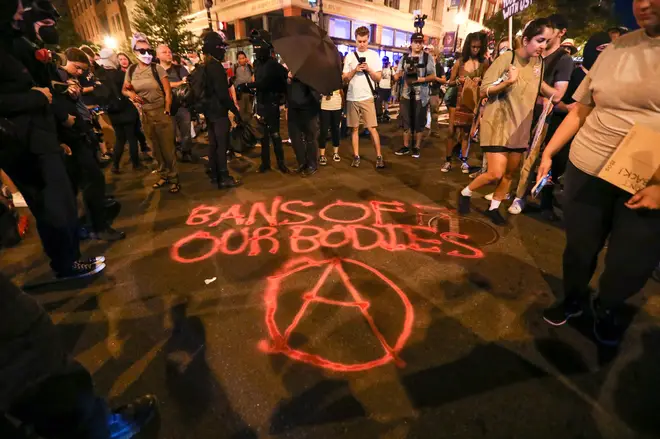
Roe v Wade was a landmark 1973 case where it was decided pregnant women were entitled to an abortion during the first three months of their pregnancy.
The judgement did not stop there from being legal restrictions, or even bans, in the second and third trimester.
Overturning Roe v Wade gives states the freedom to ban abortions before 12 weeks if they wish.
Whilst it does not automatically ban abortion across the US, some states have already passed "trigger laws" that came into effect as soon as Roe v Wade was overturned.

'Abortion puts women in danger of rape.'
The ruling, unthinkable just a few years ago, was the culmination of decades of efforts by abortion opponents, made possible by an emboldened right side of the court fortified by three appointees of former president Donald Trump.
Both sides predicted the fight over abortion would continue, in state capitals, in Washington and at the ballot box.
Justice Clarence Thomas, part of Friday's majority, urged colleagues to overturn other high court rulings protecting same-sex marriage, gay sex and the use of contraceptives.
Pregnant women considering abortions already had been dealing with a near-complete ban in Oklahoma and a prohibition after roughly six weeks in Texas.
Read more: Biden vows to 'protect women's right to choose' as US bids to overturn abortion laws
At the White House, US President Joe Biden said: "It's a sad day for the court and for the country."
He urged voters to make it a defining issue in the November elections, declaring: "This decision must not be the final word."
In Ohio, a ban on most abortions at the first detectable foetal heartbeat became the law when a federal judge dissolved an injunction that had kept the measure on hold for nearly three years.
And Utah's law was triggered by the ruling, going into effect with narrow exceptions.
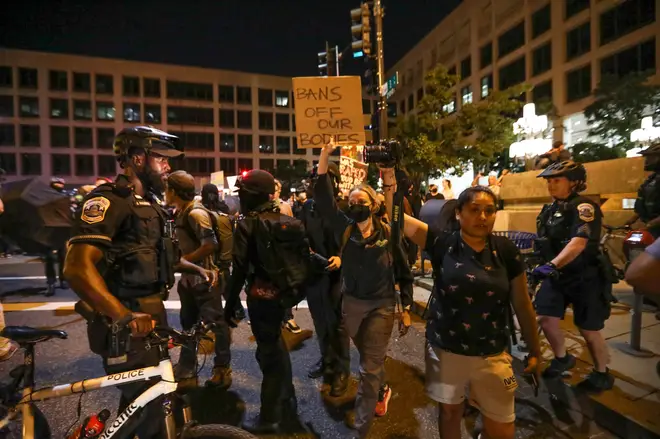
Abortion foes cheered the ruling, but abortion-rights supporters, including Mr Biden, expressed dismay and pledged to fight to restore the rights.
Mr Trump began taking credit for the Supreme Court's decision, calling it "the biggest WIN for LIFE in a generation".
He said the rulings and others "were only made possible because I delivered everything as promised, including nominating and getting three highly respected and strong Constitutionalists confirmed to the United States Supreme Court. It was my great honour to do so!"
Three Trump appointees voted on Friday to scrap Roe v Wade: Neil Gorsuch, Brett Kavanaugh and Amy Coney Barrett.
The decision is expected to disproportionately affect minority women who already face limited access to health care, according to statistics analysed by The Associated Press.
It also puts the court at odds with a majority of Americans who favoured preserving Roe, according to opinion polls.
Surveys conducted by The Associated Press-NORC Centre for Public Affairs Research and others have shown a majority in favour of abortion being legal in all or most circumstances.
But many also support restrictions especially later in pregnancy. Surveys consistently show that about one in 10 Americans want abortion to be illegal in all cases.
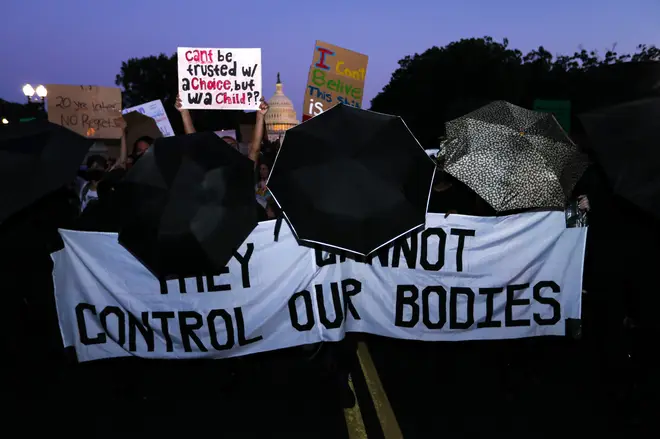
The ruling came more than a month after the stunning leak of a draft opinion by Justice Samuel Alito indicating the court was prepared to take this momentous step.
Mr Alito, in the final opinion issued on Friday, wrote that Roe and Planned Parenthood v Casey, the 1992 decision that reaffirmed the right to abortion, were wrong and had to be be overturned.
Attorney General Merrick Garland said in a statement that the Justice Department will protect providers and those seeking abortions in states where it is legal and "work with other arms of the federal government that seek to use their lawful authorities to protect and preserve access to reproductive care".
In particular, Mr Garland said the federal Food and Drug Administration had approved the use of Mifepristone for medication abortions.
More than 90 per cent of abortions take place in the first 13 weeks of pregnancy, and more than half are now done with pills, not surgery, according to the Guttmacher Institute, a research group that supports abortion rights.
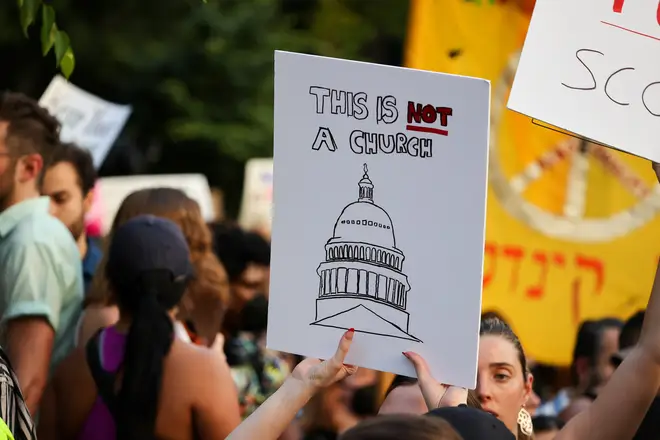
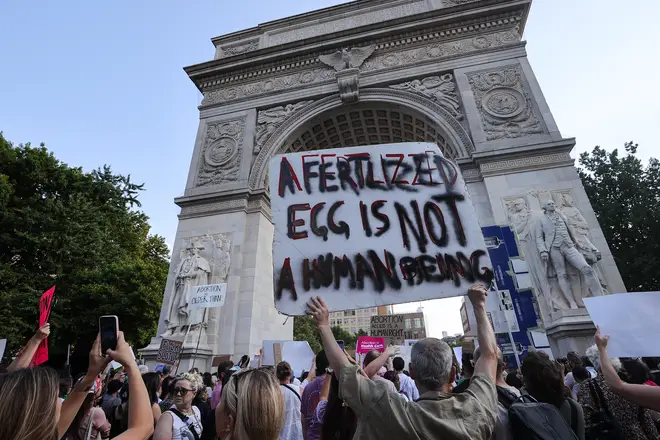
Mississippi, Alabama, Kentucky and Missouri are among 13 states, mainly in the South and Midwest, that already have laws on the books to ban abortion in the event Roe was overturned.
Another half-dozen states have near-total bans or prohibitions after six weeks of pregnancy, before many women know they are pregnant.
In roughly a half-dozen other states, including West Virginia and Wisconsin, the fight will be over dormant abortion bans that were enacted before Roe was decided in 1973 or new proposals to sharply limit when abortions can be performed, according to the Guttmacher Institute.
The Biden administration and other defenders of abortion rights have warned that a decision overturning Roe also would threaten other high court decisions in favour of gay rights and even potentially contraception.